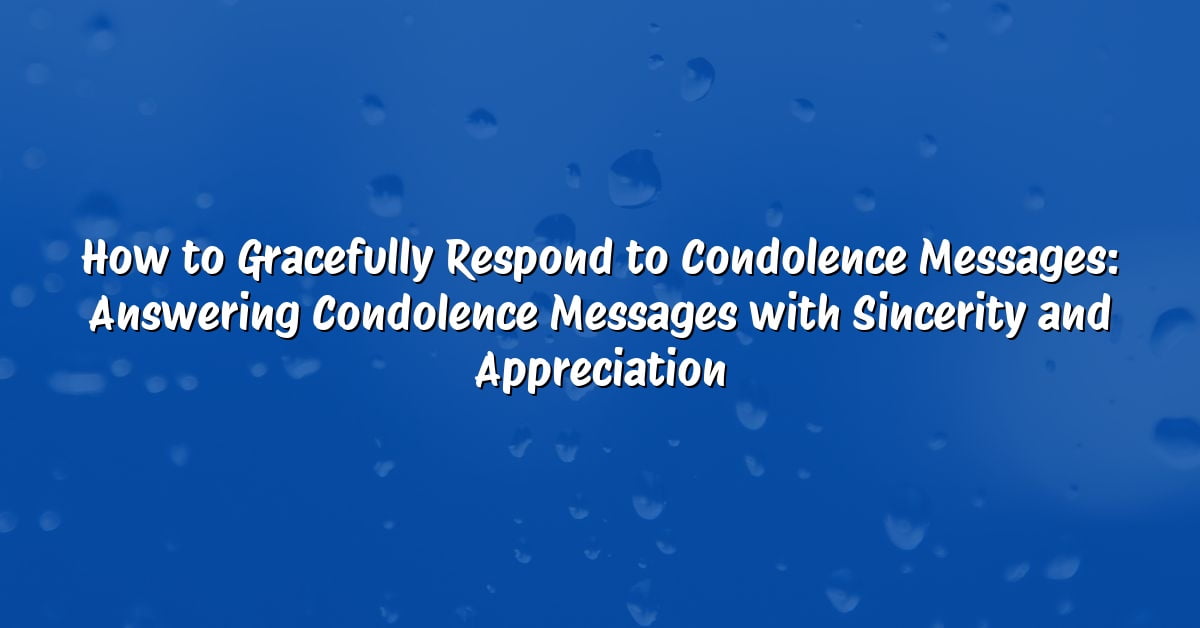Losing a loved one is undoubtedly one of the most challenging experiences we can go through in life. It’s a time when we need all the support and love we can get. One way that people express their empathy and compassion is by sending condolence messages. These heartfelt gestures of kindness can bring comfort during such a difficult time. However, figuring out how to respond to all these messages can sometimes be overwhelming. But don’t worry, I’m here to share some helpful tips and suggestions on how to navigate the process of answering condolence messages with ease.
When faced with an outpouring of sympathy from friends and family, it can be challenging to know where to start. It’s crucial to acknowledge and appreciate these messages, as they come from a place of genuine care. Taking the time to respond shows your gratitude and may even offer a sense of healing. But don’t feel pressured to respond immediately; everyone understands that mourning takes time, and you deserve that space. In this article, we’ll explore ways to navigate this important task and provide guidance on how to craft thoughtful and genuine responses to those who have reached out to offer their condolences.
Crafting personalized responses is key when answering condolence messages. While it may seem overwhelming to respond to each heartfelt message individually, it’s important to show gratitude for the support you’ve received. Remember, there’s no one-size-fits-all approach to this, and it’s essential to respond in a way that feels authentic to you. In the following sections, we’ll delve into some practical strategies and sample responses to help you navigate this process smoothly. By addressing condolence messages in a thoughtful manner, you can find solace in the love and support surrounding you during this difficult time.
Thank you messages for condolences
Losing a loved one is an incredibly difficult and painful experience, and during that time, receiving words of sympathy and support from friends and family can provide a great deal of comfort. It is important to acknowledge and express your gratitude for these heartfelt condolence messages, as they demonstrate the love and care others have for you and your loved one.
- Thank you so much for your kind words and condolences. Your support means the world to me during this difficult time.
- I am deeply touched by your sympathy and want to express my sincere appreciation for your condolences.
- Words cannot adequately express my gratitude for your compassion and support. Thank you for your heartfelt condolences.
- Your kind words brought solace to my grieving heart. Thank you for your condolences.
- Thank you for your comforting words during this dark period in my life. Your condolences have been a source of strength for me.
- I am truly grateful for your condolences. Your thoughtfulness and compassion have provided me with so much comfort.
- Thank you for reaching out to me with your condolences. Your support and love have been a ray of light in these difficult times.
- Your heartfelt words of sympathy have touched me deeply. Thank you for your condolences.
- I want to express my sincere gratitude for the condolences you have extended to me and my family. Your kindness and support have been immensely comforting.
- Thank you for your condolences and for being there for me when I needed it the most. Your presence has made a world of difference.
- Words cannot express how grateful I am for your thoughtful condolences. Your support has been invaluable to me during this challenging time.
- I am deeply appreciative of your condolences and the love you have shown me and my family. Thank you for being there for us.
- Your words of sympathy have touched my heart deeply. Thank you for your heartfelt condolences and for being by my side.
- Thank you for your kind condolences during this difficult period. Your support has meant everything to me.
- I am truly humbled by your condolences and grateful for your unwavering support. Thank you for standing with me in this time of sorrow.
During such a challenging time, it is important to acknowledge the outpouring of support and love you receive from others. Whether through cards, messages, or in-person visits, these condolences serve as a reminder of the deep impact your loved one had on the lives of others. By expressing your gratitude and appreciation for their kind words, you not only acknowledge the comfort they have provided but also strengthen the bonds of love and friendship during this difficult period.
When responding to condolences, it is important to remember that there is no right or wrong way to express your thanks. It is okay to keep your response short and simple, focusing on the appreciation for their support rather than going into too much detail about your grief. Remember to be genuine and authentic in your words, as people will appreciate your honesty and vulnerability during such a sensitive time.
Appreciation messages for condolence
When it comes to expressing gratitude for condolence messages, it is important to choose words that convey your heartfelt appreciation. These messages not only acknowledge the sympathy and support you have received during a difficult time but also bring comfort to those who extended their condolences. Here are 15 heart-touching examples of appreciation messages that you can use to respond to condolence messages:
- Thank you for your kind words and support during this incredibly difficult time. Your thoughtfulness means the world to me.
- Words cannot express how grateful I am for your condolences. Your compassion and support have been a source of strength for my family and me.
- Your comforting words have provided solace in this period of grief. I am truly thankful for your heartfelt condolences.
- Knowing that we have friends like you who care and understand has made this journey a little less painful. Thank you for your condolences.
- Your condolences have given us comfort and reminded us that we are not alone in our sorrow. Thank you for your unwavering support.
- The kindness and sympathy you have shown have touched our hearts deeply. We appreciate your condolences more than words can express.
- During this difficult time, your condolences have meant the world to us. Thank you for your unwavering support and understanding.
- We are grateful for the love and support you have shown us with your condolences. Your words have provided much-needed comfort and strength.
- While we navigate through this dark time, your condolences have been a guiding light. Thank you for your unwavering support and compassion.
- Your thoughtful condolences have touched our hearts deeply. We are truly grateful for your words of comfort and sympathy.
- Thank you for taking the time to send your condolences. Your kindness has meant more to us than words can express.
- Amidst the grief, your condolences have brought moments of solace. Your compassion has been a constant source of strength for our family.
- Knowing that we have friends like you who care and are there for us has brought warmth to our hearts. Thank you for your condolences.
- Your heartfelt condolences have provided much-needed comfort during this difficult time. We appreciate your support more than we can say.
- In our darkest hours, your condolences have given us hope and strength. Thank you for your unwavering support and genuine sympathy.
- We are deeply touched by your condolences. Your words have provided a glimmer of light during this dark period of our lives.
Expressing gratitude for the condolences you have received is an important part of the grieving process. Responding with appreciation not only allows you to acknowledge the support you have received but also helps to create a sense of connection and comfort in your own healing journey. Each heartfelt message of appreciation shows that you are grateful for the condolences and that they have made a difference. Remember, it’s okay to take your time in responding to the messages as you navigate through your emotions. Your appreciation will undoubtedly bring warmth to the hearts of those who reached out to you.
Take care and may you find solace and strength during this challenging time.
Ways to express gratitude for condolence messages
Condolence messages play a vital role in providing comfort and support to those who have lost a loved one. When we receive these heartfelt messages, it is essential to express our gratitude to those who took the time to reach out and offer their sympathies. Here are some heartfelt ways to show appreciation for condolences received:
-
“Thank you for your kind words and sympathy during this difficult time. Your support means the world to me.”
-
“I am deeply touched by your thoughtfulness and expressions of sympathy. Your compassion has brought comfort to my grieving heart.”
-
“Your heartfelt message brought tears to my eyes and warmth to my soul. Thank you for being by my side during this challenging period.”
-
“Your condolences have been a source of strength for me. I am so grateful to have you in my life.”
-
“Your words of comfort have provided solace to my grieving heart. Thank you for your unwavering support.”
-
“I am deeply touched by your sincerity and condolences. Your words have given me immense strength to face this loss.”
-
“Thank you for being a pillar of support during this difficult time. Your love and concern mean everything to me.”
-
“I want to express my heartfelt gratitude for your condolences. Your kind words have been a source of healing for me and my family.”
-
“Your empathy and understanding have brought me so much comfort. Thank you for your heartfelt condolences.”
-
“In moments of grief, it is the support of friends like you that makes a world of difference. Thank you for your comforting words and thoughts.”
-
“I cannot thank you enough for your heartfelt condolence message. Your words have given me strength and courage during this difficult time.”
-
“Your condolences have touched my heart deeply, and I am grateful for your unwavering support. Thank you for being there for me.”
-
“I am finding solace in the beautiful words of sympathy and support I have received. Thank you for being one of those sources of comfort.”
-
“Your heartfelt message brought light into the darkness of my grief. Thank you for being such a compassionate friend.”
-
“Your condolences have provided me with strength and courage. I am incredibly fortunate to have you in my life. Thank you for your unwavering support.”
-
“I am deeply moved by your kind words and condolences. Thank you for your love and support during this challenging time.”
Expressing gratitude for condolence messages is a way to acknowledge the support and love extended to us during our time of loss. It is essential to let those who reached out to us know just how much their words meant to us. By doing so, we not only show our appreciation but also deepen the bonds of friendship and support. Remember, a simple “thank you” can go a long way in conveying our gratitude.
When responding to condolences, it is important to express ourselves genuinely and from the heart. Taking the time to craft a thoughtful and personal message can make all the difference. Whether through a handwritten note or a heartfelt email, expressing gratitude for condolences is an opportunity to reflect on the love and support we have received.
Condolence Response Etiquette
Responding to condolence messages can be a challenging task, as it requires sensitivity and thoughtfulness. While there is no one-size-fits-all approach, there are some etiquette guidelines that can help you navigate this difficult time. Here are some important points to keep in mind when responding to condolence messages:
- Show your gratitude: Express your appreciation for the messages of sympathy and comfort you received. Let the sender know that their kind words meant a lot to you.
- Keep it personal: Tailor your response to each individual’s message. Acknowledge specific words of support or specific memories they shared.
- Be sincere: Honesty and genuineness in your response are key. Avoid using cliches or generic phrases.
- Respond in a timely manner: Although grief can feel overwhelming, try to reply to condolence messages within a reasonable time frame. It shows that you value the sender’s support.
- Take your time: It’s okay to take some time to compose your response. Grief can make it difficult to find the right words, so don’t rush the process.
- Mention the deceased: Acknowledge the person who passed away by name, sharing a fond memory or expressing what their presence meant to you.
- Offer comfort: Return the gesture of comfort by offering kind words or a heartfelt wish to the sender during their time of loss, if appropriate.
- Keep it simple: Your response doesn’t have to be lengthy or elaborate. A brief and heartfelt message is often more than enough.
- Use appropriate language: Tailor your response to the relationship you had with the sender. If it’s a close friend or family member, you can use a more informal tone.
- Send personal acknowledgments: In some cases, if the volume of condolence messages is overwhelming, you can send a general acknowledgment message to thank everyone collectively for their support.
- Express your emotions: If you feel comfortable, you can share a bit about your emotions or how you’re coping with the loss. This can help others understand your state of mind.
- Offer help: If the sender is someone you’re close to, you can extend an offer of support or assistance during their grieving process.
- Avoid self-centric responses: While it’s natural to be deeply affected by the loss, try to avoid turning the response into a focus on yourself. Keep the attention on the deceased and the sender.
- Proofread your message: Take a moment to review your response for any spelling or grammar errors. This demonstrates care and attention to detail.
- Show empathy: Respond with empathy and understanding, acknowledging the pain and sorrow the sender may be experiencing.
- End on a positive note: Conclude your response by offering well wishes to the sender and expressing hope that they find comfort and strength in the days ahead.
Remember, responding to condolence messages is a personal choice, and there is no right or wrong way to do it. Trust your instincts and do what feels most authentic to you. Your response should reflect your unique relationship with the sender and the deceased. Ultimately, the most important thing is to show gratitude and appreciation for the support you have received during this difficult time.




